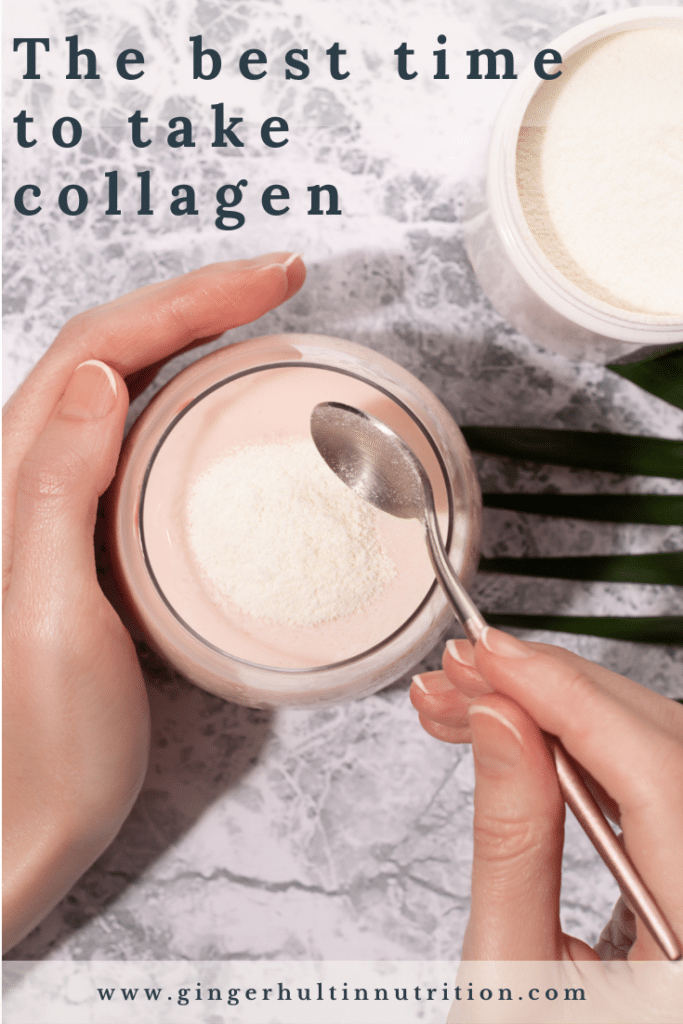The Best Time to Take Collagen
June 5, 2023 by Ginger Hultin MS RDN
Collagen has become increasingly popular in the world of nutrition and health. It is mainly touted for its cosmetic benefits, but collagen is not just for cosmetic purposes… it is essential to the human body’s structure and function. So if you’ve been wondering, what is the best time to take collagen to get the most out of it? Do you even need to consume collagen protein? Let’s start by diving into some context:
What is collagen?
There are 28 (known) types of collagen in the body that play important roles in structure and function. Let’s take a look at where to find the top five most common types in the body:
- Type I*: bones, cartilage, muscles, skin, tendons
- Type II: cartilage
- Type III: blood vessels, muscles, organs
- Type IV: skin
- Type V: eyes, hair, skin
*Type I is by far the most common form, making up 90% of all collagen in the body.
Collagens are a family of three stranded proteins that are essential to the structure and integrity of multiple organs, blood vessels/veins, and hair/nails. Collagen molecules are a combination of one or more of three amino acids: glycine, proline, and hydroxyproline. The different types of collagen are different sequences and combinations of these amino acids with various other types of amino acids found in the body.
Collagen proteins are a vital part of your body composition due to their long, stable chains of amino acids and woven strands. This durable structure makes it tensile and strong: ideal for providing structure and shape to various body tissues. This structure also supports mechanical properties and functions such as skin elasticity, organ protection, and resistance in the joints.

Dietary intake of collagen
Did you know that collagen protein is only produced in animals (including humans)? Since collagen proteins are exclusive to animals and such a large part of animal body composition, many believe that the only (or even the ‘best’) way to increase the amount of collagen in your body is to consume collagen-rich animal products: beef, poultry, eggs, dairy, seafood.
I have good news for my fellow plant-based friends! You do not need to eat collagen in order to increase the amount of collagen in your body. All you need to do is focus on consuming a balanced plant-based diet!
To understand this, it’s important to know how collagen is digested and used by the body when eaten or taken as a supplement. Proteins, including collagen, are too large to be absorbed by the body as they are. Proteins must be digested using enzymes to break the bonds and separate the amino acids to be absorbed and distributed throughout the body as needed.
Natural collagen production
The body has efficient pathways in place for producing its own collagen from available amino acids. Collagen can be produced intracellularly (within the cell) or extracellularly (outside the cell) and the creation process is dependent on enzymes and micronutrients like copper, manganese, vitamin C, and zinc. By supplying the body with amino acids and these nutrients, you can give it the necessary pieces to create collagen.
While it is important to focus on consuming the main three amino acids in collagen (glycine, proline, and hydroxyproline), they are non-essential amino acids meaning the body is able to form them out of other amino acids. In this case, there are four more amino acids to consider as ‘sources’ of the main three: glycine can be synthesized from threonine, serine, and choline, and proline/hydroxyproline from glutamate.
The best way to increase your collagen is to focus on foods rich in these amino acids and nutrients so that your body has the necessary supplies to create its own collagen. While consuming collagen protein (animal products) may be one way to supply your body with these amino acids, there are more than enough plant-foods full of the same amino acids – just not in the form of collagen. Plant-foods are also more nutrient-rich, containing the vitamins and minerals necessary for this process in addition to amino acids.
Here are the best plant-based foods you can eat to boost collagen production:
Beans and Legumes: Chickpeas, kidney beans, lentils, lima beans, soybeans, tofu
Fruits: Blueberries, guava, kiwi, mangos, melon, oranges, pineapples, pomegranate
Grains: Fortified cereals, oats, rice, whole wheat
Nuts and Seeds: Almonds, cashews, flaxseeds, peanuts, pistachios, pumpkin seeds, sunflower seeds, walnuts
Vegetables: Asparagus, avocado, beets, bell peppers, broccoli, cabbage, cauliflower, cherry tomatoes, corn, mushrooms, peas, red potatoes, seaweed, spinach, tomatoes, watercress
Other: Black pepper, cocoa, coffee
What about collagen supplements?
Collagen supplements are a quick and easy way to consume the amino acids necessary to support the body’s own collagen production. It is, however, important to note that since collagen can only be made by animals, all supplements containing actual collagen molecules come from animal sources (typically bones, connective tissues, shells from marine life) and are not suitable for a vegan lifestyle.
Yes, there are “plant-based collagen” supplements, but be aware, these do not contain collagen. Vegan or vegetarian (non fish/non animal-based) supplements instead apply the same principles discussed above by supplying you with amino acids and micronutrients that promote collagen synthesis extracted from plant-based sources.
It is important to remember that a plant-based diet is missing a few other key nutrients that are more commonly found in animal products like vitamin B12. Many plant-based eaters elect to take supplements to ensure they are getting adequate amounts of these vital nutrients. Ultimately, taking supplements is the choice of the consumer, and can be incorporated into a plant-based diet.
What is the best time to take collagen?
There is mixed research and scientific data available about what time of day is best to take collagen, but there are a few things to consider based on known principles of nutrition and digestion:
- The body is not designed to digest massive amounts of protein at once. Current research suggests that only 20-25g of protein at a time can be used for lean mass or cell production. Any protein beyond this is likely broken down as energy or excreted as waste.
- To optimize your absorption of the amino acids required for collagen creation, spread your intake of these collagen promoting amino acids across multiple meals/snacks. By distributing your intake over the day, you give your body adequate time to process the amino acids. For collagen production, this means you are allowing those collagen promoting amino acids to be available for use making collagen, rather than being used as energy or excreted as waste.
- The best time to take collagen can also depend on your goals. If you are trying to build muscle, the best time to take collagen to get the most out of it is directly after a workout when your body is in the recovery state. This is thought to be when your body is most efficient at using amino acids to build tissue, and remember, type I and III collagen are a major component of the muscles.
There is another approach to thinking about the “timing” of collagen intake. As you age, the collagen in the body begins to degrade and synthesis of new collagen may slow. Perhaps the question of timing is rather at what age is it best to think about adding foods into your diet to help maintain collagen synthesis.
There is no better time to start taking care of your body than right now.
Here are some of my favorite recipes full of these collagen promoting nutrients:
https://gingerhultinnutrition.com/coconut-chickpea-and-tomato-curry/
https://gingerhultinnutrition.com/wild-blueberry-oatmeal-smoothie/
https://gingerhultinnutrition.com/5-minute-apple-spied-overnight-oats/
https://gingerhultinnutrition.com/cocoa-coconut-chia-pudding/
References:
- Holwerda, A, J C van Loon, L. The impact of collagen protein ingestion on musculoskeletal connective tissue remodeling: a narrative review, Nutrition Reviews, Volume 80, Issue 6, June 2022, Pages 1497–1514, https://doi.org/10.1093/nutrit/nuab083
- Li P, Wu G. Roles of dietary glycine, proline, and hydroxyproline in collagen synthesis and animal growth. Amino Acids. 2018 Jan;50(1):29-38.
- Schoenfeld BJ, Aragon AA. How much protein can the body use in a single meal for muscle-building? Implications for daily protein distribution. J Int Soc Sports Nutr. 2018 Feb 27;15:10. doi: 10.1186/s12970-018-0215-1.
- Wu M, Cronin K, Crane JS. Biochemistry, Collagen Synthesis. [Updated 2022 Sep 12]. In: StatPearls [Internet]. Treasure Island (FL): StatPearls Publishing; 2023 Jan-. Available from: https://www.ncbi.nlm.nih.gov/books/NBK507709/
2 Comments
Leave a Comment

Ginger Hultin,MS, RD, CSO
Thanks for visiting! If you're struggling with a cancer diagnosis, autoimmune condition, gut health problems, or even a medical mystery, nutrition can make a HUGE difference in your day-to-day life. I run a virtual, concierge private practice where I partner with my clients over time to help them improve their health through nutrition. Be sure to visit the blog for easy, plant-based, anti-inflammatory recipes and our "Resources" page for a variety of self-paced programs, books, e-books, and nutrition podcast episodes.








Nice post
Thanks for stopping by!